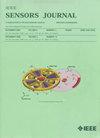噪声信道上能量采集传感器的状态估计:高斯混合方法
IF 4.3
2区 综合性期刊
Q1 ENGINEERING, ELECTRICAL & ELECTRONIC
引用次数: 0
摘要
研究了一种能量采集传感器在加性噪声信道上的远程状态估计问题。基于能量的传感器调度导致远程估计器的随机间歇测量。由于信道噪声的破坏,传输指标变量对远程估计器是未知的。首先,给出了传感器能量的条件概率分布和期望通信速率的封闭表达式;然后,推导出精确最小均方误差(mmse)状态估计器为一个成分呈指数增长的高斯混合滤波器。最后,提出了一种近似的mmse估计方法,通过粒子滤波方法对高斯混合滤波器的混合系数进行数值计算,从而降低了计算复杂度。仿真结果表明了高斯混合形式下精确mmse估计器的有效性和近似mmse估计器的计算优势。本文章由计算机程序翻译,如有差异,请以英文原文为准。
State Estimation With an Energy Harvesting Sensor Over a Noisy Channel: A Gaussian Mixture Method
This article investigates a remote state estimation problem with an energy harvesting sensor over an additive noise channel. An energy-based sensor scheduler results in the random intermittent measurements at the remote estimator. Due to the corruption of channel noises, the transmission indicator variables are unknown to the remote estimator. First, the conditional probability distributions of the sensor energy and the closed-form expression of the expected communication rate are given. Then, the exact minimum mean-squared error (mmse) state estimator is derived to be a Gaussian mixture filter with exponentially increasing components. Finally, an approximate mmse estimator is proposed to reduce the computational complexity, in which the mixing coefficients of the Gaussian mixture filter are calculated numerically by the particle filtering method. Simulation results show the effectiveness of the exact mmse estimator in Gaussian mixture form and the computational advantage of the approximate mmse estimator.
求助全文
通过发布文献求助,成功后即可免费获取论文全文。
去求助
来源期刊

IEEE Sensors Journal
工程技术-工程:电子与电气
CiteScore
7.70
自引率
14.00%
发文量
2058
审稿时长
5.2 months
期刊介绍:
The fields of interest of the IEEE Sensors Journal are the theory, design , fabrication, manufacturing and applications of devices for sensing and transducing physical, chemical and biological phenomena, with emphasis on the electronics and physics aspect of sensors and integrated sensors-actuators. IEEE Sensors Journal deals with the following:
-Sensor Phenomenology, Modelling, and Evaluation
-Sensor Materials, Processing, and Fabrication
-Chemical and Gas Sensors
-Microfluidics and Biosensors
-Optical Sensors
-Physical Sensors: Temperature, Mechanical, Magnetic, and others
-Acoustic and Ultrasonic Sensors
-Sensor Packaging
-Sensor Networks
-Sensor Applications
-Sensor Systems: Signals, Processing, and Interfaces
-Actuators and Sensor Power Systems
-Sensor Signal Processing for high precision and stability (amplification, filtering, linearization, modulation/demodulation) and under harsh conditions (EMC, radiation, humidity, temperature); energy consumption/harvesting
-Sensor Data Processing (soft computing with sensor data, e.g., pattern recognition, machine learning, evolutionary computation; sensor data fusion, processing of wave e.g., electromagnetic and acoustic; and non-wave, e.g., chemical, gravity, particle, thermal, radiative and non-radiative sensor data, detection, estimation and classification based on sensor data)
-Sensors in Industrial Practice
 求助内容:
求助内容: 应助结果提醒方式:
应助结果提醒方式:


